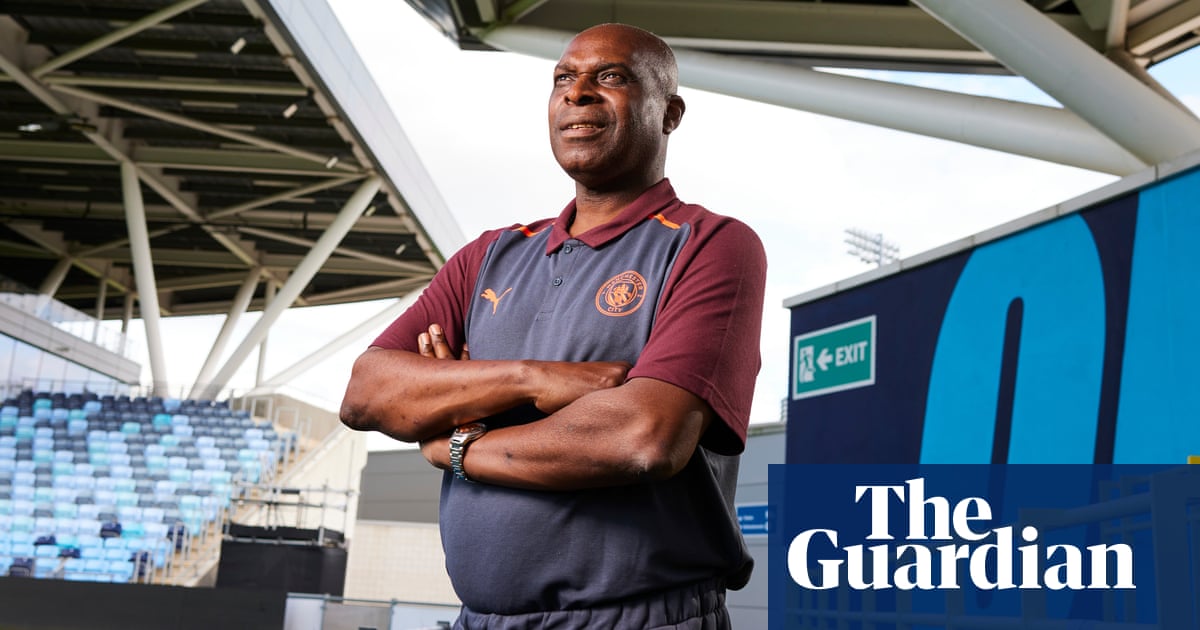
‘These stories can be intimidating for so many reasons,” Kae Tempest says of the classical Greek tragedies. “But more than that, they are galvanising. They give you something that was important thousands of years ago that lands you more fully in the now. They have this roaring effect, where we’ve brought the past with us.”
Tempest, who uses they/them pronouns, is a revelatory writer and performer, seamlessly blending the ancient and the new. Much of their work is steeped in the history and magic of Greek myths, from the Ted Hughes award-winning Brand New Ancients, which places the gods alongside us modern mortals, to the hypnotic, flesh-filled poetry collection Hold Your Own, based on the story of gender-switching prophet Tiresias.
Now Paradise, the Mercury-nominated writer’s adaptation of the Sophocles tragedy Philoctetes, is about to open at the Olivier, the largest stage at the National Theatre in London. We speak on the last day of rehearsals, Tempest sitting in the Olivier foyer with director Ian Rickson and actor Lesley Sharp, all exhausted, exhilarated and relieved to have made it this far.
First performed in 409BC, Sophocles’ drama, one of his lesser-performed plays, focuses on three soldiers. Philoctetes – the only soldier brave enough to step forward and light Heracles’s funeral pyre, winning the hero’s bow as a reward – has spent 10 years on an island, abandoned by Odysseus on the way to Troy. When Odysseus needs Philoctetes again in order to fight, he returns to the island with young soldier Neoptolemus, and attempts to trick the older man into leaving the island with them. The original involves godly intervention, acceptance of fate, and an overriding devotion to triumph and battle-fuelled glory.
Following largely the same structure, but questioning the morals, meanings and ending of Sophocles’ original, Tempest sets this adaptation in a non-time, where weapons from the gods sit alongside references to flatscreen TVs. “When you do these plays,” Rickson says, “they allow you to unpack what heroism is. Concepts that Sophocles was fascinated by – dignity, honour, exile, trust – are as important now as 3,000 years ago. It’s the stuff of life.”
It was Rickson who introduced Tempest to the story of Philoctetes. A mentor to the writer for several years, he invited them to a reading performed by ex-servicemen. “There was a resonance to their reading,” Tempest says. “It was like watching a conversation between soldiers 3,000 years apart.” Rickson – who directed Jez Butterworth’s Jerusalem, which returns to the West End in 2022 – adds: “When you give an old play to a writer, you never know what it will do to them. But you want them to take it and run. Reading Kae’s poetry, and being a superfan of Brand New Ancients, I felt a synergy with what Sophocles was doing. I really felt he would enjoy Kae taking it on.”
Our lonely, wounded hero Philoctetes is played by Sharp, best known for police drama Scott & Bailey, the National’s A Taste of Honey, and perhaps the scariest episode of Doctor Who ever, Midnight. Sharp did not wait for the part to be offered to her. “You either say: ‘Well, I’ll keep my fingers crossed and hope it might come my way’ – or you declare your love and interest. I’ve always sat back and kept my fingers crossed.” But after an early workshop for Paradise, in which she felt something “elemental”, she made her wishes clear. “I just felt something had happened,” she says. “I was a better actor for having engaged in that work. I sent Ian an email: ‘If this ever gets to a place where it’s going to be put on and you decide to cast the men as women, please could I throw my hat in the ring?’”
The role – which she describes as a “damaged, defiant, old, smelly, naughty, lost, lost, lost soul” – was hers. “It feels like one of those moments that don’t come along very often in an artistic life,” Sharp says. “The role is extraordinary. And usually, a man gets to do it.”
Tempest adds: “As a writer, you get so much wrong. At first, there were men playing men. They were incredible, the guys that came to read these parts. But I took a step back and just thought, ‘Hang on a minute, I’ve gone against my own belief systems. I’ve just made a play where the men are doing the acting and the women are just sitting around.’” When Sharp read as Philoctetes, Tempest says, the performance of masculinity, embedded in the text, became clearer – and the role came alive. The cast is now entirely made up of women, with Odysseus played by Anastasia Hille and Neoptolemus by Gloria Obianyo.
These questions of casting took place in parallel with something larger. “My own journey of my own gender was happening,” Tempest says. In August 2020, they announced that they were non-binary, changing their name. At the same time, they were “trying to grapple with what [the play] was trying to say about gender, which is often the way”. In The Bricks That Built the Houses, their 2016 novel navigating harsh corners of London life, one of the protagonists, Harry, was originally written as male. “It took me two drafts before I got up the guts to say: ‘No, this character’s female, or presents as female.’ Quite often in my work, the first draft is what I’m not yet brave enough to negate.”
For Paradise, Tempest always knew the members of the chorus were going to be female, as opposed to Sophocles’ male sailors. “There is life that is usually ignored in these grand old stories,” they say, “that had to be persisting, surviving, not just on the peripheries of the drama, but central to it.”
In their first non-fiction book, On Connection, published during the pandemic, Tempest writes: “Empathy is remembering that everybody has a story.” Paradise’s chorus is a testament to that. The women speak in verse, the words weaving between them as the soldiers argue. Cynical and watchful, curious and cruel, they defy cliche and fate. They have agency. “Each of those characters,” Tempest says, “has as much of a hero’s quest as Phil.”
Tempest has been loving rehearsals. “The feeling in the room is like nothing I’ve ever experienced,” they say. “It’s the best summer of my life. The things I’m learning about what actors are capable of doing, and how they approach text, it’s just blowing my mind.”
The foyer we are talking in is almost empty, the night before it is due to fill up with the first non-socially-distanced audiences. Like most shows this year and in 2020, Paradise was hit with delays owing to Covid. Opening night should have been last summer. Their collective feeling is one of relief and gratitude to be back, to be working, to be here.
“I felt very moved by seeing all of the staff who’ve kept it ticking over while it’s been asleep,” Sharp says, looking around. “I feel like [the building] is very glad to have life coming back into it,” Rickson agrees. “The delays were upsetting,” he says, “but they allowed the work to mature, because it’s a mountain to climb. You have to step back, look at it and say: ‘OK, that’s a good route. Let’s go down again and think about it.’
The pandemic has influenced the text, admits Tempest. “I didn’t go back to the draft and say, ‘I’d better make it about Covid.’ But I trust that the guts of the text will be full with what we’re all going through. In a really obvious way, it’s about a soldier isolated in a cave who is given this opportunity to leave his isolation. So, of course, that has all the resonances of what we’ve all been through. There’s a lot about survival, wounds, recovery, victimhood, vengeance – and before Covid those words had different resonances.
“But the beautiful thing about performed language is that it can reverberate with whatever’s happening in the moment. The text holds it.” The writer pauses, then adds: “It’s heavy magic when you get in a room and speak these old stories.”












